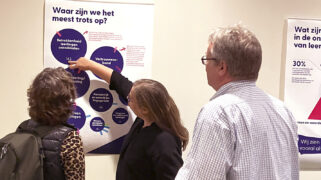Labcraft: how do innovation labs cultivate change?
A book about social innovation lab practices that is written by lab practitioners, for lab practitioners.
- Betrokken KL'ers
- Kimon Moerbeek
- Marlieke Kieboom

Out now: Labcraft: how innovation labs cultivate change! Labcraft is the first of its kind: a book about social innovation lab practices that is written by lab practitioners, for lab practitioners. In Labcraft the co-authors offer humble observations about their struggles and successes, and details on how they navigate their unique dilemmas and paradoxes in their labs.
To produce Labcraft, 12 lab practitioners from 7 innovation labs from the UK, Kosovo, USA, Cambodia, Netherlands and France came together on a windy, isolated farm in Stratford-upon-Avon (UK) for a four-day Book Sprint. At a mind-boggling speed they shared and wrote down their stories, experiences and perspectives about their work on governance, education, electricity grids, public hygiene and more. Marlieke Kieboom and Kimon Moerbeek represented Kennisland by co-authoring about Kennisland’s Education Pioneers, a lab which supports teachers in their innovative practices. What are the commonalities and differences between the lab workers about topics like: prototyping, scaling, curating lab teams, politics and power? Find it out by downloading Labcraft now!
Why Labcraft?
There 12 lab practitioners from 7 innovation labs from the UK, Kosovo, USA, Cambodia, Netherlands and France came together on a windy, isolated farm in Stratford-upon-Avon (UK) for a four-day Book Sprint.is lot of talk about social innovation labs. This year has seen a string of events++Check Social Innovation Generation’s Lab Knowledge Hub for more resources on labs., tours, and conferences on labs around the world. There is one upcoming in Singapore. All of these meetings are useful, constructive, good for networking. But they also have one other common denominator: a scarcity of lab practitioners and therefore, little attention for practice. Remko Berkhout, editor and convenor of Labcraft, accounts on the Labcraft Facebook page: “The hard core practitioners would have a lot to say and ask about what it means to do this kind of work. What they are learning along the way. What they need to thrive. There are conversations and exchanges to be had about the ‘real stuff’ of labs – where the rubber of high ambitions such as systemic change, fundamental renewal, co-creation and innovation, hit the road of a messy world full of contradictions, diverging interests, suffocating time-frames, hegemonic ideas around problem solving and so on.” Labcraft aims to give space to the knowledge of lab practitioners to show how they do their work, and to point out where their opportunities and challenges lieLabcraft aims to give space to the knowledge of lab practitioners to show how they do their work, and to point out where their opportunities and challenges lie. .
This project has resulted from a shared interest into the practices of social innovation labs by Kennisland, Hivos, Natural Innovation, The Finance Innovation Lab and Warwick Business School (WBS). Labcraft editors Remko Berkhout and Hendrik Tiesinga met last year during Lab2, a lab on social innovation labs, organised by Hivos and Kennisland. Kennisland previously published “Lab Matters: Challenging the practice of social innovation laboratories”++Lab MattersWhat are the 4 common oversights of labs? And what are the 10 things we could do about them? Learn more by reading Lab Matters by Marlieke Kieboom. and runs labs with policy makers, professionals and citizens over social challenges like elderly care and women shelters (in cooperation with InWithForward).
How did Labcraft come about?
Labcraft came about in a Book Sprint. On monday the co-authors didn’t know each otherOn monday the co-authors didn’t know each other. On tuesday they were up to 20.000 words.. On tuesday they were up to 20.000 words. On wednesday they reviewed each other’s work over strong discussions, countless editing, painful deleting, excellent rewriting and a lot of head-scratching. On thursday they continued, sleep deprived++Read Magali’s (27e Region Lab) personal account on how Labcraft came about in four days (in French).. But at 12AM midnight they were able to call those 10.000 words a book, with a title, a table of contents and grappling stories. But more importantly, they ended up with a wealth of knowledge about each others work, and peer-friends to call upon for years to come.
Lab Book Sprint from Natural Innovation on Vimeo.
Why a Book Sprint?
Editors and conveners Remko Berkhout and Hendrik Tiesinga have deliberately chosen to use the Book Sprint methodology because this way of knowledge production seemingly fits the way labs aim to work too: rapid, profound, inclusive and collaborative. Adam Hyde++Adam Hyde is an ex-digital pioneer, a closed Kennisland project., founder of the Book Sprint++The Book Sprint team just finished a Book Sprint about Book Sprints. Learn all about the philosophy, history and practice of Book Sprints in their publication. writes: “A Book Sprint is a process for collaborative engagement and knowledge production. Simply put, it is a group of people and a facilitator coming together to write a book in three to five days. This form of writing has both a technical and a social dimension, which together enable the book to be written. Most important, a Book Sprint opens a space of collaboration for knowledge extraction, generation, and production.”
Who should you read Labcraft?
Anyone who is trying to answer complex societal questions of today. Anyone who acknowledges that previous approaches become rapidly outdated. Anyone who works in labs and is looking for new inspiration and knowledge from peers. Anyone with a curiosity in the work of labs.




